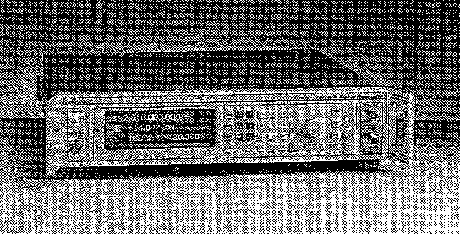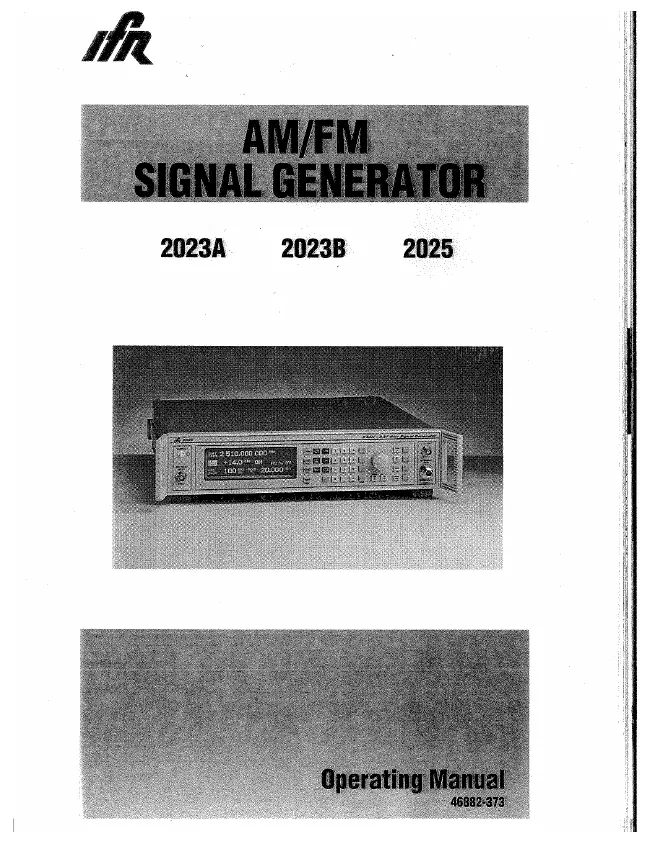IFR - 2023B - Generator
Manufacturer:

Image 1 of 1
If you have any other photos or manuals for the
IFR 2023B
you can
upload the files here.
Equipment:
2023B
Date:
1999
Category:
Group:
Sub Group:
Information
Introduction
The 2023A, 2023B and 2025 are portable and lightweight
synthesized signal generators covering the frequency range 9
kHz to 1.2 GHz (2023A), 9 kHz to 2.05 GHz (2023B), and 9 kHz
to 2.51 GHz (2025). A dot matrix display with a
comprehensive set of utility menus allows flexibility of
operation and ease of use. The RF output can be amplitude,
frequency, phase or pulse modulated. An internal
programmable AF source is capable of generating simultaneous
two-tone modulation.
All parameters can be entered from a front panel keyboard,
and a rotary control can be used to adjust most settings.
Microprocessor control ensures that the instrument is
flexible and easy to use and allows programming by either
the General Purpose Interface Bus (GPIB) or by RS-232. The
GPIB is designed to IEEE Standard 488.2. The interfaces
allow remote control of all functions except the supply
switch, and allow the instrument to be used either manually
or as part of a fully automated test system.
Main features Operation
Selection of parameters on the screen may involve one or
more of the numeric, hard or menu selection keys or the
rotary control knob. Parameters may be set to specific
values by numeric key entry, while values may be varied in
steps of any size using the DOWN/UP keys or altered by
moving the control knob, set to a particular sensitivity.
Display
The display is a dot matrix liquid crystal panel, with
backlighting. Display contrast may be varied to accommodate
differing lighting conditions and the setting saved in
memory. A graphical display test is available to the user.
Frequency selection
Carrier frequency is either selected directly via the
keyboard or remotely via the interfaces. Frequency
resolution is 1 Hz across the band. A series of carrier
frequencies can be stored in non-volatile memory for recall
when required.
Output
RF output up to +13 dBm can be set by direct keyboard entry
with a resolution of 0.1 dB over the entire range. For
instruments fitted with the high power option, RF output is
increased to +25 dBm. A carrier ON/OFF key is provided to
completely disable the output.
A choice of level units is available to the user and
provision is made for the conversion of units (for example,
dBm to μν) by a simple keypress.
An electronic trip protects the generator output against
reverse power of up to 50 W. This prevents damage to output
circuits when RF or DC power is accidentally applied to the
RF OUTPUT connector.
To facilitate testing of receiver squelch systems, an
attenuator hold function allows control of the RF output
without introducing RF level drop-outs from the step attenuator.
The RF output level can be offset by up to ±5.0 dB to
compensate for cable or switching losses, or standardize a
group of instruments.
Maximum RF output level can be set so as to protect
sensitive devices connected to the RF OUTPUT socket.
1 Manual
User manual
Manual type:
User manual
Pages:
244
Size:
11.6 MB
Language:
english
Revision:
Issue 5
Manual-ID:
46882-373
Date:
September 1999
Quality:
Scanned document, all readable.
Upload date:
May 24, 2015
MD5:
b9be1a44-0cd6-b5a4-2f43-4d711abbade1
Downloads:
2296
